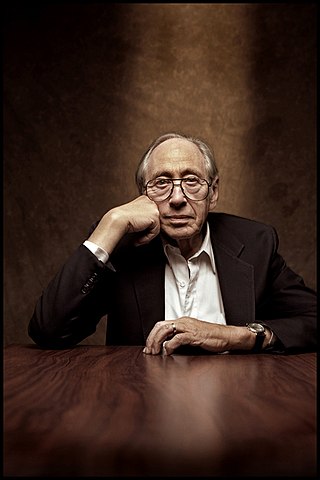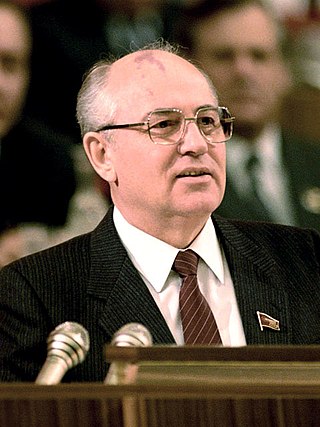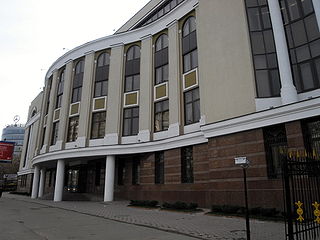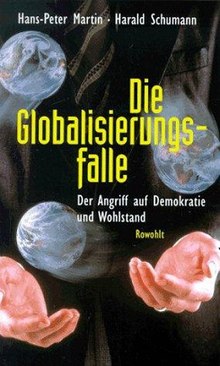
Alvin Eugene Toffler was an American writer, futurist, and businessman known for his works discussing modern technologies, including the digital revolution and the communication revolution, with emphasis on their effects on cultures worldwide. He is regarded as one of the world's outstanding futurists.
The history of the Soviet Union from 1982 through 1991 spans the period from the Soviet leader Leonid Brezhnev's death until the dissolution of the Soviet Union. Due to the years of Soviet military buildup at the expense of domestic development, and complex systemic problems in the command economy, Soviet output stagnated. Failed attempts at reform, a standstill economy, and the success of the proxies of the United States against the Soviet Union's forces in the war in Afghanistan led to a general feeling of discontent, especially in the Soviet-occupied Baltic countries and Eastern Europe.

Mikhail Sergeyevich Gorbachev was a Soviet and Russian politician who served as the last leader of the Soviet Union from 1985 to the country's dissolution in 1991. He served as General Secretary of the Communist Party of the Soviet Union from 1985 and additionally as head of state beginning in 1988, as Chairman of the Presidium of the Supreme Soviet from 1988 to 1989, Chairman of the Supreme Soviet from 1989 to 1990 and the President of the Soviet Union from 1990 to 1991. Ideologically, Gorbachev initially adhered to Marxism–Leninism but moved towards social democracy by the early 1990s. He was the first and only Soviet leader born after the country's foundation.

Perestroika was a political reform movement within the Communist Party of the Soviet Union (CPSU) during the late 1980s, widely associated with CPSU general secretary Mikhail Gorbachev and his glasnost policy reform. The literal meaning of perestroika is "restructuring", referring to the restructuring of the political and economic systems of the Soviet Union, in an attempt to end the Era of Stagnation.

The Pareto principle states that for many outcomes, roughly 80% of consequences come from 20% of causes.
In welfare economics, a Pareto improvement formalizes the idea of an outcome being "better in every possible way". A change is called a Pareto improvement if it leaves everyone in a society better-off. A situation is called Pareto efficient or Pareto optimal if all possible Pareto improvements have already been made; in other words, there are no longer any ways left to make one person better-off, without making some other person worse-off.
Realpolitik is the approach of conducting diplomatic or political policies based primarily on considerations of given circumstances and factors, rather than strictly following ideological, moral, or ethical premises. In this respect, it shares aspects of its philosophical approach with those of realism and pragmatism. It is often simply referred to as pragmatism in politics, e.g. "pursuing pragmatic policies" or "realistic policies".

In neoclassical economics, market failure is a situation in which the allocation of goods and services by a free market is not Pareto efficient, often leading to a net loss of economic value. The first known use of the term by economists was in 1958, but the concept has been traced back to the Victorian philosopher Henry Sidgwick. Market failures are often associated with public goods, time-inconsistent preferences, information asymmetries, non-competitive markets, principal–agent problems, or externalities.
The term "new world order" refers to a new period of history evidencing dramatic change in world political thought and the balance of power in international relations. Despite varied interpretations of this term, it is commonly associated with the notion of world governance.
Microeconomic reform comprises policies directed to achieve improvements in economic efficiency, either by eliminating or reducing distortions in individual sectors of the economy or by reforming economy-wide policies such as tax policy and competition policy with an emphasis on economic efficiency, rather than other goals such as equity or employment growth.
There were people and organizations who predicted that the USSR would dissolve before the eventual dissolution of the USSR in 1991.

Global Green is the English-American affiliate of Green Cross International, an international non-governmental organization founded by former Soviet leader Mikhail Gorbachev in 1993 to "foster a global value shift toward a sustainable and secure future." Green Cross International operates in over 30 countries and enjoys consultative status with the United Nations Economic and Social Council, and United Nations Educational, Scientific and Cultural Organization. Global Green USA is on a 10 year mission to "lead a global response to keep us within planetary boundaries" and to "bring forth a sustainable global society founded on respect for nature, universal human rights, economic justice, and a culture of peace". GCI is an admitted observer organization with the United Nations Framework Convention on Climate Change and the Conference of the Parties to the UN Convention to Combat Desertification. It also cooperates directly with the UNEP/OCHA Environmental Emergencies Section, UN-HABITAT and other international organizations. Celebrity advocates include Leonardo DiCaprio, Yoko Ono and Pat Mitchell, who serves as an Honorary Board Member.

The 11th Hour is a 2007 documentary film on the state of the natural environment created, produced, co-written and narrated by Leonardo DiCaprio. It was directed by Leila Conners Petersen and Nadia Conners and financed by Adam Lewis and Pierre André Senizergues, and distributed by Warner Independent Pictures.

The Gorbachev Foundation is a non-profit organization headquartered in Moscow, founded by the former Soviet leader Mikhail Gorbachev in December 1991 and began its work in January 1992. The foundation researches the Perestroika era, as well as issues of Russian history and politics. It was financed by Gorbachev and donations by people and companies.
Global workforce refers to the international labor pool of workers, including those employed by multinational companies and connected through a global system of networking and production, foreign workers, transient migrant workers, remote workers, those in export-oriented employment, contingent workforce or other precarious work. As of 2012, the global labor pool consisted of approximately 3 billion workers, around 200 million unemployed.
The full understanding of the history of the late Soviet Union and of its successor, the Russian Federation, requires the assessment of the legacy of Leonid Brezhnev, the third General Secretary of the Central Committee of the Communist Party of the Soviet Union (CPSU) and twice Chairman of the Presidium of the Supreme Soviet. Leonid Brezhnev was the leader of the CPSU from 1964 until his death in 1982, whose eighteen-year tenure has been recognized for developing the most powerful military, and for social and economic stagnation in the late Soviet Union.

The history of the Soviet Union from 1964 to 1982, referred to as the Brezhnev Era, covers the period of Leonid Brezhnev's rule of the Union of Soviet Socialist Republics (USSR). This period began with high economic growth and soaring prosperity, but gradually significant problems in social, political, and economic areas accumulated, so that the period is often described as the Era of Stagnation. In the 1970s, the Soviet Union and the United States both took a stance of "detente". The goal of this strategy was to warm up relations, in the hope that the Soviet Union would pursue economic and democratic reforms. However, this did not come until Mikhail Gorbachev took office in 1985.

The Geneva Summit of 1985 was a Cold War-era meeting in Geneva, Switzerland. It was held on November 19 and 20, 1985, between U.S. President Ronald Reagan and Soviet General Secretary Mikhail Gorbachev. The two leaders met for the first time to hold talks on international diplomatic relations and the arms race.
On 7 January 1989, Ruhollah Khomeini, supreme leader of Iran, sent a letter to Mikhail Gorbachev, the General Secretary of the Soviet Union. This letter was Khomeini's only written message to a foreign leader. Khomeini's letter was delivered by the Iranian politicians Abdollah Javadi-Amoli, Mohammad-Javad Larijani, and Marzieh Hadidchi. In the letter, Khomeini declared that communism was dissolving within the Soviet bloc, and invited Gorbachev to consider Islam as an alternative to communist ideology.

On Saudi Arabia: Its People, Past, Religion, Fault Lines—and Future is a book by American journalist Karen Elliott House about the future of Saudi Arabia. House has visited the country for more than 30 years, and she describes the country for regional specialists and public readers alike in her book. The book provides information on human rights and global politics and their importance to the future of Saudi Arabia. It offers insights into the "kingdom's fault lines", as well as suggestions for a positive diplomacy that encourages modest reforms.











